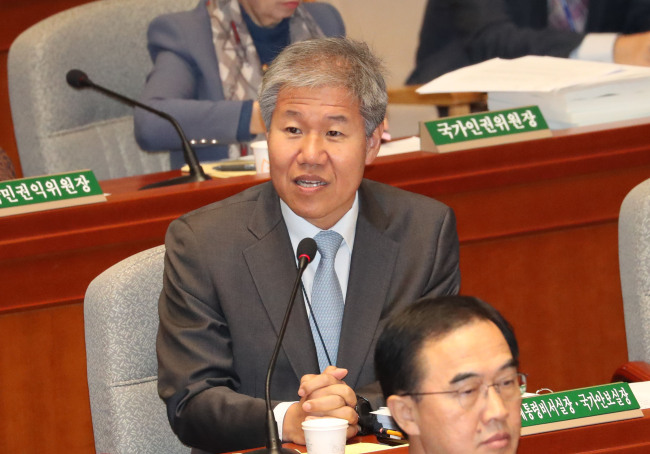South Korea’s newly appointed economic policymakers -- in contrast to their predecessors who took office with high hopes upon the inauguration of the Moon Jae-in administration -- appear to be off to a rocky start, amid escalating concerns and disapproval of the government’s economic policy direction.
For the time being, the newly appointed deputy prime minister for economy and presidential chief of staff for policy are expected to press ahead with Moon’s disputed economic policies.
At the heart of the dispute is the “income-led growth” initiative, one of the core pillars of President Moon’s economic visions, which has come under fire repeatedly over the past year against the backdrop of the nation’s slow growth and stalled job figures.
The presidential office Cheong Wa Dae on Friday announced the replacement of Deputy Prime Minister and Finance Minister Kim Dong-yeon and presidential chief of staff for policy Jang Ha-sung. The two had long been in apparent conflict over their policy perspectives, especially concerning the disputed minimum wage hike plan and its impact on the economy.
To fill their posts, Cheong Wa Dae tapped insiders, gesturing that it plans to carry through its current policy keynotes without making drastic changes. Minister Kim was replaced by Hong Nam-ki, chief of the Office for Government Policy Coordination, and Jang by senior presidential secretary for social affairs Kim Soo-hyun.
While Kim started his term immediately, nominee Hong will undergo a parliamentary confirmation hearing before taking office.
Their appointment came amid mounting warnings for Asia’s fourth-largest economy. Global credit ratings firm Moody’s last week adjusted its next-year forecast for Korea’s growth rate at 2.3 percent, down 0.4 percent from the Bank of Korea’s 2.7 percent.
 |
Kim Soo-hyun, newly appointed Presidential Chief of Staff for Policy, speaks in a parliamentary committee meeting on Monday. (Yonhap) |
“My role will be to support the deputy prime minister as presidential secretary,” Kim said in a press briefing Sunday, underlining teamwork with Finance Minister nominee Hong.
“President Moon has asked me to take charge of the integrated operation of social and economic policies in general, which I understood as his underlying intention to fully empower the deputy prime minister when it comes to the economy,” Kim also said.
Despite the top Cheong Wa Dae official’s low-key gesture, a number of political observers including opposition lawmakers claimed Kim is the real heavyweight on the new economic policymaking team.
“Hong, who is an obedient bureaucrat, is likely to be overshadowed by ideologically biased Kim, in which case our economy is doomed,” Sohn Hak-kyu, chairman of the minor opposition Bareunmirae Party, wrote on his social media account, lashing out at the latest reshuffle.
Kim’s ties to President Moon trace back to 2003, when both worked in the liberal Roh Moo-hyun administration, the former as secretary for state affairs and the latter as chief of staff. Kim also served as a policymaker for Moon’s presidential campaigns in both 2012 and 2017.
Observers point out that while Jang was officially the top policymaker, it was actually Kim who took the lead in shaping Moon’s core economic policies -- including the nuclear phase-out plan, real estate regulations and income-led growth paradigm.
It is due to these circumstances his appointment as chief of staff was viewed as the president’s signal to maintain current policy keynotes.
“Income-led growth, innovative growth and fair economy all come as a package,” Kim said.
“(The Moon administration) has no plan whatsoever to modify the direction of the (policy) framework.”
But Kim’s policy plans are now likely to boomerang on him as most of them have so far failed to produce tangible results.
The country’s jobless rate hit its highest point in September since 2005, prolonging the jobs crisis, which incumbent Minister Kim partly attributed to the drastic pace of the wage hike.
The real estate market has for months been swallowed up by speculation frenzy, despite the government’s incremental series of loan restrictions and taxation of affluent multiple home owners.
The nuclear phase-out plan, which aimed at shifting the nation’s power supplies by 2022, has also come under fire recently, due to huge deficits recorded by Korea Electric Power Corp.
By Bae Hyun-jung (
tellme@heraldcorp.com)








